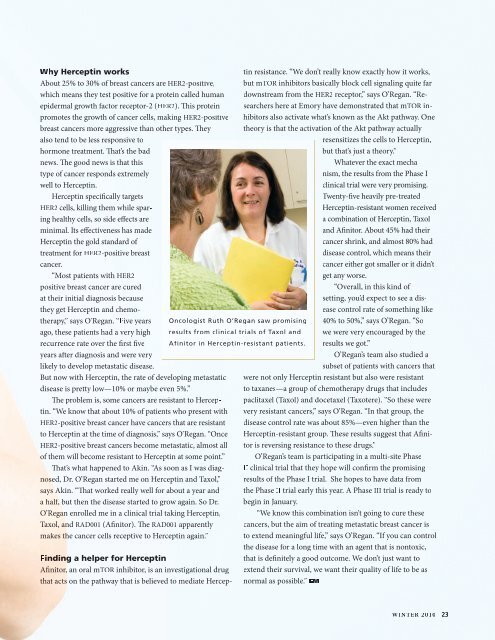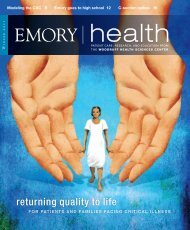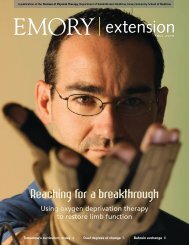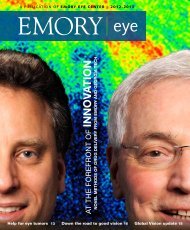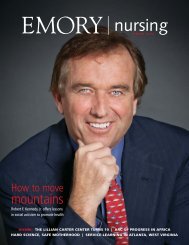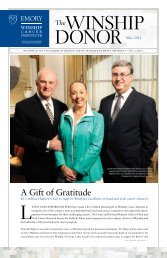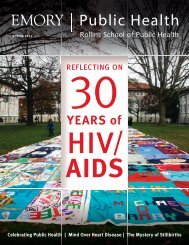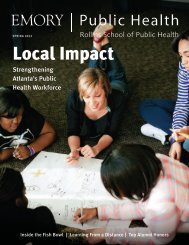medicine - Woodruff Health Sciences Center - Emory University
medicine - Woodruff Health Sciences Center - Emory University
medicine - Woodruff Health Sciences Center - Emory University
You also want an ePaper? Increase the reach of your titles
YUMPU automatically turns print PDFs into web optimized ePapers that Google loves.
why Herceptin works<br />
tin resistance. “We don’t really know exactly how it works,<br />
About 25% to 30% of breast cancers are HER2-positive, but mTOR TOR inhibitors basically block cell signaling quite far<br />
which means they test positive for a protein called human downstream from the HER2 receptor,” says O’Regan. “Re-<br />
epidermal growth factor receptor-2 (HER2). This protein searchers here at <strong>Emory</strong> have demonstrated that mTOR TOR inpromotes<br />
the growth of cancer cells, making HER2-positive hibitors also activate what’s known as the Akt pathway. One<br />
breast cancers more aggressive than other types. They theory is that the activation of the Akt pathway actually<br />
also tend to be less responsive to<br />
resensitizes the cells to Herceptin,<br />
hormone treatment. That’s the bad<br />
but that’s just a theory.”<br />
news. The good news is that this<br />
Whatever the exact mecha-<br />
type of cancer responds extremely<br />
nism, the results from the Phase I<br />
well to Herceptin.<br />
clinical trial were very promising.<br />
Herceptin specifically targets<br />
Twenty-five heavily pre-treated<br />
HER2 cells, killing them while spar-<br />
Herceptin-resistant women received<br />
ing healthy cells, so side effects are<br />
a combination of Herceptin, Taxol<br />
minimal. Its effectiveness has made<br />
and Afinitor. About 45% had their<br />
Herceptin the gold standard of<br />
cancer shrink, and almost 80% had<br />
treatment for HER2-positive breast<br />
disease control, which means their<br />
cancer.<br />
cancer either got smaller or it didn’t<br />
“Most patients with HER2-<br />
get any worse.<br />
positive breast cancer are cured<br />
“Overall, in this kind of<br />
at their initial diagnosis because<br />
setting, you’d expect to see a dis-<br />
they get Herceptin and chemoease<br />
control rate of something like<br />
therapy,” says O’Regan. “five years Oncologist Ruth O’Regan saw promising 40% to 50%,” says O’Regan. “So<br />
ago, these patients had a very high results from clinical trials of Taxol and we were very encouraged by the<br />
recurrence rate over the first five Afinitor in Herceptin-resistant patients. results we got.”<br />
years after diagnosis and were very<br />
O’Regan’s team also studied a<br />
likely to develop metastatic disease.<br />
subset of patients with cancers that<br />
But now with Herceptin, the rate of developing metastatic were not only Herceptin resistant but also were resistant<br />
disease is pretty low—10% or maybe even 5%.”<br />
to taxanes—a group of chemotherapy drugs that includes<br />
The problem is, some cancers are resistant to Hercep- paclitaxel (Taxol) and docetaxel (Taxotere). “So these were<br />
tin. “We know that about 10% of patients who present with very resistant cancers,” says O’Regan. “In that group, the<br />
HER2-positive breast cancer have cancers that are resistant disease control rate was about 85%—even higher than the<br />
to Herceptin at the time of diagnosis,” says O’Regan. “Once Herceptin-resistant group. These results suggest that Afini-<br />
HER2-positive breast cancers become metastatic, almost all tor is reversing resistance to these drugs.”<br />
of them will become resistant to Herceptin at some point.” O’Regan’s team is participating in a multi-site Phase<br />
That’s what happened to Akin. “As soon as I was diag- II clinical trial that they hope will confirm the promising<br />
nosed, Dr. O’Regan started me on Herceptin and Taxol,” results of the Phase I trial. She hopes to have data from<br />
says Akin. “That worked really well for about a year and the Phase II trial early this year. A Phase III trial is ready to<br />
a half, but then the disease started to grow again. So Dr. begin in January.<br />
O’Regan enrolled me in a clinical trial taking Herceptin, “We know this combination isn’t going to cure these<br />
Taxol, and RAD001 (Afinitor). The RAD001 apparently cancers, but the aim of treating metastatic breast cancer is<br />
makes the cancer cells receptive to Herceptin again.” to extend meaningful life,” says O’Regan. “If you can control<br />
the disease for a long time with an agent that is nontoxic,<br />
finding a helper for Herceptin<br />
that is definitely a good outcome. We don’t just want to<br />
Afinitor, an oral mTOR TOR inhibitor, is an investigational drug extend their survival, we want their quality of life to be as<br />
that acts on the pathway that is believed to mediate Hercep- normal as possible.” EM<br />
WINTER 2010 23


